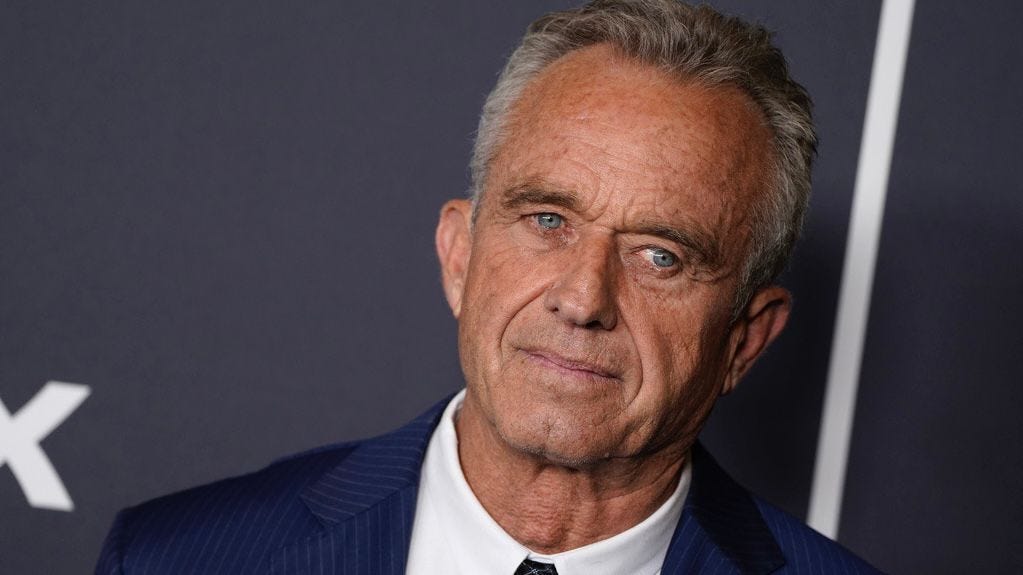Can RFK Jr Actually Win?
What actually happens when you vote for a third party candidate
In the hours after Trump’s attempted assassination, RFK Jr.’s phone buzzed.
It was former Fox News host Tucker Carlson, with another person on the group text. The text contained Donald Trump’s phone number.
Kennedy had been doing interviews after the Trump shooting, because, as a Kennedy, he has firsthand experience with assassinations. Kennedy said he’d like to talk to Trump, and later that night, the two spoke on the phone.
They agreed to meet in person in Milwaukee during the Republican National Convention.
During those conversations, which are being reported on by multiple news sources, RFK Jr broached the subject of leaving the race, and potentially endorsing Trump. They also talked about a possible role for Kennedy in a Trump administration, either in a cabinet position or in a role that did not require Senate confirmation.
They didn’t reach a final deal, and Kennedy has not dropped out or formally endorsed Trump. Kennedy maintains he is “in it to win it.”
But the conversations show that maybe Kennedy isn’t actually in it to win it. Only time will tell.
But this leads me to the question I am asked dozens of times a day. Is voting for a third party candidate worth it? Is it wasting your vote?
Let’s pretend you have three options for dinner. Choice one is chocolate cake, two is beets, and three is rotten fish.
Your first choice is chocolate cake. Chocolate cake is obviously the most delicious. Beets don’t sound that tasty, but at least they are edible. And you most definitely wouldn’t want to eat rotten fish.
The problem is that in the contest of what to have for dinner, a lot more people (and yes, this is inexplicable to some) want to eat beets or rotten fish. Chocolate cake has no chance of winning.
So what happens if you vote for a third party candidate, what you view as chocolate cake, anyway? Chances are good you could help rotten fish win the dinner contest, when your second choice would have been beets.
This is because the group of people who want something edible for dinner split their votes up.
Here’s an example. Let’s say that these are the election results:
Chocolate cake: 15%
Beets: 40%
Rotten fish: 45%
Who wins in this scenario? Right, it’s rotten fish.
But what if the people who want edible food for dinner all voted for one thing, instead of splitting up their votes?
Then the dinner contest would look like this:
Beets: 55%
Rotten fish: 45%
Now you’re thinking, “Wait, I never wanted rotten fish to win, I just wanted to make a point that beets weren’t my first choice. I wanted to tell people that chocolate cake was obviously way more delicious than beets!”
And that is because under the current system, voting for chocolate cake has an INDIRECT impact on the dinner contest. Because chocolate cake has no hope of winning due to a variety of factors like Big Beets and Powerful Rotten Fish, voting for chocolate cake impacts the election. It just impacts the election in a way you did not directly intend.
Now, let’s talk about the actual election in front of us. Many of you feel excited about voting for RFK, Jr. You like his policies, or you like the change in perspective, or you feel disillusioned by the two party system.
RFK cannot win the presidential election, and voting for him is making the choice to indirectly impact the election, instead of directly impacting it. (Which is your choice to make, of course.)
Why can’t he win? In addition to the many issues with the two party system, RFK Jr has too many challenges and obstacles to give him broad electoral appeal.
First, Kennedy is staunchly against vaccines and has dedicated much of his career to this topic. Most people get their children vaccinated, and while there is a range of perspectives on making medical decisions for your own children, this is not a platform that translates well into national politics. He was banned from Twitter for promoting false information on this topic, and is still involved in a lawsuit against the Biden Administration over it.
A recent Vanity Fair article looked more closely at Kennedy’s past, including an allegation from a former babysitter who said RFK Jr sexually assaulted her.
Eliza Cooney was 23 when she was hired in 1998 to help take care of Kennedy’s children and assist him at his environmental law clinic. Cooney says one evening, during a meeting with another volunteer, Kennedy began moving his hand up and down her leg under the table. She said the behavior continued over several occasions, including once when he came up behind her and groped her.
After the Vanity Fair article was published, Kennedy texted Cooney, saying he didn’t remember the incident and “never intended you any harm. If I hurt you, it was inadvertent. I feel badly for doing so.”
In May, Kennedy revealed that doctors had found a worm in his brain more than a decade earlier, after he sought medical help for mental fogginess and memory problems. Initially worried it might be a brain tumor, doctors saw a dark spot on a scan, which they confirmed was a worm that had died. Kennedy said he thinks he got it while traveling.
He also says his memory issues are related to mercury poisoning from eating too much predatory fish like tuna and perch. His family says it's more likely from the 14 years he used heroin.
These are just a handful of issues that make it difficult for large numbers of people to support him.
Why can’t he win?
Rightly or wrongly, the way the political system is set up in the US gives huge advantages to Democrats and Republicans.
Both parties have massive money-making fundraising apparatuses, along with volunteers and staffers working on behalf of the candidate across the country. In the past, people like Michael Bloomberg and Ross Perot made a run for it, but they were billionaires, funded most of their campaign themselves, and both still lost.
Even getting on the ballot is tough.
According to his campaign, Kennedy is officially on the ballot in ten states, and has submitted the required signatures to get onto 15 more states, along with four more states where the signatures have been collected but not turned in yet.
The ten states give him a possible total of 129 electoral college votes, far shy of the 270 needed to win the election (and that’s not considering the unfeasible scenario that he’d win all of those states).
Also, don’t forget, 48 states are winner-take-all, which means even if the vote is split 50.1% to 49.9%, the person with the most votes wins ALL of the electoral votes for that state.
For example, in 1992, Ross Perot won 19% of the total popular vote, and still won zero electoral college votes.
So is voting third party wasting your vote? Your vote is your voice. So only you can decide what you want to say: do you want to directly impact the outcome of the election, or indirectly impact it?
What do you think? Are you considering voting for a third party candidate? Tell me below in the comments.







Thank you for this clear breakdown Sharon! I would love to have more options beyond our two party system, but this article clearly shows how that battle can’t be won per se during a presidential election. It seems that we need to advocate and work for election reforms at the local levels if we want to see change on a national level!
No, I won’t be voting for chocolate cake. I won’t be indirectly supporting Trump. I want my kids to be able to vote in their future. I want them to have rights as full fledged citizens. I want to live the rest of my life which is more than likely another 60-70 years ahead of me with the same freedoms I have enjoyed for the last 34 years. Until we reform our constitution to allow more parties, potentially get rid of the electoral college I won’t be voting for chocolate cake. I will only be voting for the candidates that have a record of supporting democracy.